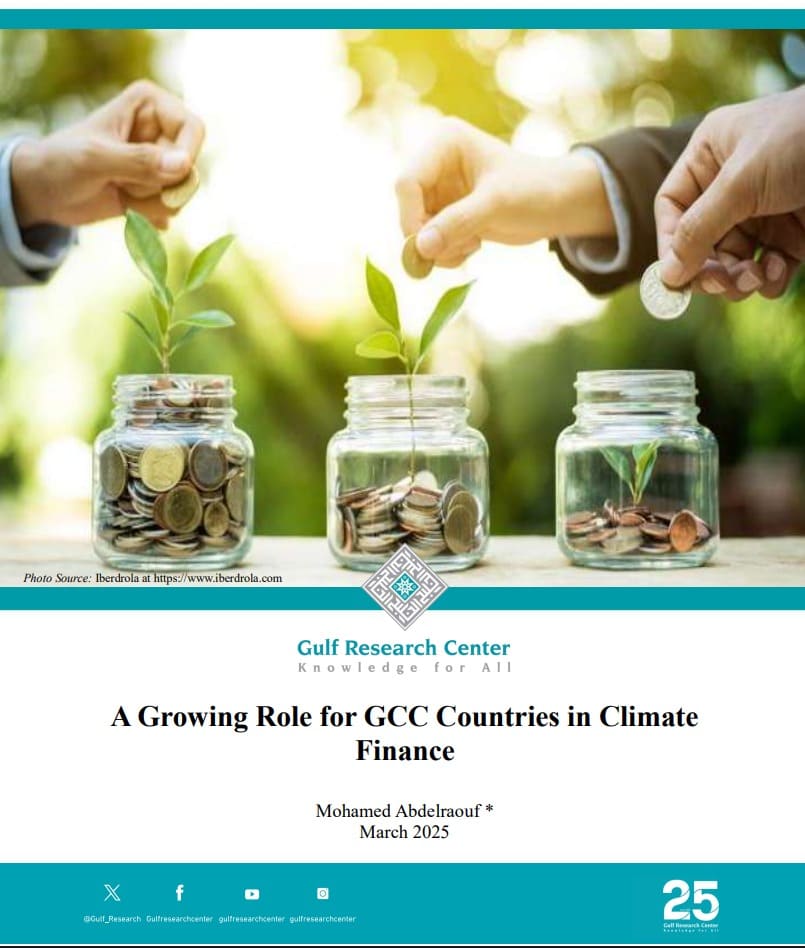
The landscape of climate finance programming in the Gulf Cooperation Council (GCC) countries has been evolving in recent years, with these nations increasingly recognizing the need to address climate change both within their borders and globally. Climate finance in the GCC is largely shaped by both governmental and private sector initiatives, driven by a combination of policy shifts, investments in green technology, and a desire to play a more prominent role in global climate action.
Key Features of GCC Climate Finance Landscape
The GCC countries are aligning their national development plans with climate change mitigation goals. For instance, the UAE’s "Energy Strategy 2050" and Saudi Arabia’s "Vision 2030" include significant components related to renewable energy and reducing carbon emissions. They are also aiming to attract international investments into clean energy projects and provide financial incentives.
GCC countries, particularly Saudi Arabia, the UAE, and Qatar, have vast sovereign wealth funds (e.g., Saudi Arabia’s Public Investment Fund and the UAE’s Mubadala Investment Company) that are increasingly focused on green investments and sustainability. These funds invest in renewable energy, sustainable infrastructure, and clean technologies, both domestically and internationally.
In addition, GCC countries have seen a growing trend in the issuance of green bonds. The UAE, for example, issued its first green bond in 2019, and both Qatar and Saudi Arabia have since followed suit. These bonds are used to fund renewable energy projects, energy efficiency upgrades, and other green initiatives.
Contributions to Climate Finance
Outside of support for renewable energy projects, the GCC states have contributed to multilateral climate finance mechanisms, such as the Green Climate fund (GCF) and the Global Environment Facility (GEF), which fund projects for developing countries. For example, Qatar has pledged contributions to the GCF to support projects aimed at climate change adaptation and mitigation.
The United Arab Emirates (UAE) has been the most active on advancing climate and environmental financing initiatives, particularly following the COP28 summit. This has included initiatives such as the ALTÉRRA Climate Fund that was launched at COP28 with the UAE pledging an initial $30 billion investment. The fund aims to mobilize $250 billion globally by 2030, focusing on making climate finance more accessible, especially for developing countries. ALTÉRRA seeks to attract private capital to invest in green projects worldwide. In addition, there are initiatives such as the UAE-US Partnership for Accelerating Clean Energy (PACE), the UAEPacific Partnership Fund (UAE-PPF), the UAE-Caribbean Renewable Energy Fund, and Clean Energy Collaboration with Italy and Albania.
In Saudi Arabia, the Public Investment Fund (PIF) has established a Green Finance Framework, committing to develop 70% of Saudi Arabia's renewable energy target by 2030. As a founding member of the One Planet Sovereign Wealth Fund initiative, PIF aims to accelerate the transition to a low greenhouse gas economy among sovereign wealth funds and asset managers.
The Qatar Investment Authority (QIA) also actively participates in global climate initiatives, embedding sustainability principles across its investment portfolio. This approach aligns with Qatar's sovereign mandate for responsible, long-term value creation, emphasizing that green finance will shape the future of the global sovereign wealth industry. The Qatar Fund for Development (QFFD) supports international efforts to mobilize climate finance for mitigating and adapting to climate change effects. In addition, in December 2024, Qatar announced a £1 billion ($1.3 billion) investment in climate technology in the United Kingdom to support the energy transition, create jobs, and establish climate tech hubs in both nations, benefiting companies like Rolls-Royce in developing sustainable technologies.
The Kuwait Investment Authority (KIA), meanwhile, is a founding member of the One Planet Sovereign Wealth Fund Working Group, established in 2017. This initiative aims to integrate climate change risks into investment decisions and promote the transition to a low-emissions economy.
Examples of Other Global Cooperation
GCC countries have been collaborating with other Middle Eastern and North African (MENA) nations to fund climate adaptation and mitigation projects, with a focus on renewable energy and water conservation. For example, Oman and India announced a joint fund for sustainable infrastructure with a committee focusing on mutual interests in renewable energy, technology, healthcare, and tourism.
The GCC region has also become an important source of climate finance for African countries, driven by both governmental initiatives and private sector investments. While the flows are not as large-scale as those from major Western donors or multilateral organizations, GCC climate finance is notable for its focus on specific areas such as renewable energy, infrastructure, and water management, which are critical to many African nations. Entities like the Abu Dhabi Fund for Development (ADFD) have financed several renewable energy projects across Africa including solar projects in countries like Morocco and Tunisia. Additionally, the UAE has played a key role in the International Renewable Energy Agency (IRENA), helping to promote renewable energy across the African continent. The UAE's Dubai Cares initiative focuses on improving education in African countries, and there are specific programs aimed at addressing climate change through building adaptive infrastructure in vulnerable regions.
Conclusion
The GCC states are enhancing their role in global climate finance by expanding their partnerships with developing countries, particularly through joint investments in renewable energy, sustainable agriculture, and climate adaptation projects. There is also growing potential in areas like green hydrogen.
However, there are still some challenges in mobilizing GCC-based climate finance for developing countries, including political instability in certain regions, complexities of local governance, and the need for more robust frameworks to ensure transparency and accountability in financial flows. While the scale of climate finance from the GCC countries is still developing, the trend points toward an increasing role for these countries in supporting climate resilience and sustainable development.
Dr. Mohamed Abdelraouf is the Director of the Environmental Security and Sustainability Research Program at the Gulf Research Center.

